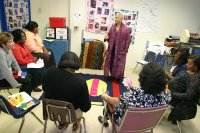How a District Prioritizes Administrator PD
Using low-resource practices like instructional rounds and biweekly strategic meetings can boost professional development for administrators.
Your content has been saved!
Go to My Saved Content.School districts often focus on developing teaching staff, but they may struggle to establish a climate of lifelong learning for their building administrators and content-area supervisors. Emails, phone calls, teacher observations, and handling emergent issues may push professional growth goals down the priority list. To address this issue, our school district designated time within the school day for book clubs, biweekly leadership meetings, and instructional rounds. These scheduled events ensure that the administrative team receives relevant, ongoing professional development.
Learning from a Book Club
A weekly book club can be an enjoyable way for administrators across a district to work as a team, learn something new, and discuss ways to enhance their practice. We select an annual theme and then choose books related to that theme throughout the year. The texts do not have to tie directly to education. We’ve enjoyed many books about psychology, sociology, and business. Collaboratively examining texts about sociology, psychology, and business gives an opportunity to explore how a book’s concepts relate to our school setting. We are currently reading Robin DiAngelo’s White Fragility: Why It’s So Hard for White People to Talk About Racism, which relates to our focus for the year: equity in education.
Keep the reading assignment manageable. My leadership team gathers every Friday morning before school begins, and all administrators have an open invitation to join the conversation. Because of our busy schedules, we read a chapter or two per week. Opening the meeting with a check-in gives participants an opportunity to share what’s happening within each department and their own lives. We then spend the rest of the hour discussing the selected work. These text-based conversations provide insight on best leadership practices and help us brainstorm about ways to implement various strategies and resources to support student learning. The book club is an easy and accessible way to build professional development into busy schedules.
Working Through Strategy Sessions
A few years ago, a professional development consultant recommended that we divide our biweekly meetings into two segments. The first part is dedicated to the “Technical Stuff”— reminders, check-ins, and larger discussion topics such as budgeting—and the second half, called “Strategy Work,” is dedicated to professional development tied directly to our district vision and mission. This year, our “Strategy Work” focuses on reviewing data about achievement, discipline, advanced courses, and extracurricular participation to identify trends and address gaps. After we review the data, we reflect upon how our leadership can support equitable practices, collaborate on how we want to define “equity” for our district, and determine what actions need to be taken to ensure that all of our learners have access and opportunity.
The meeting topics can also connect to the book club discussions. When we read Jo Boaler’s Mathematical Mindsets: Unleashing Students' Potential through Creative Math, Inspiring Messages and Innovative Teaching, I designed sessions about the eight Mathematical Practices, three-act math problems, and authentic tasks, and how to provide effective feedback when observing math lessons. This work helped our team craft a coherent vision for how we want mathematics to look, sound, and feel in our school district. We also generated pre- and postevaluation questions so that those administrators who were not as knowledgeable about mathematical content could consider ways to improve pre- and postobservation questions. They also had the opportunity to consider ways these conversations could improve their understanding of content knowledge. Administrators shared that these sessions enhanced their understanding of mathematics instruction and helped them provide more effective, targeted feedback to improve teacher practice.
Implementing Instructional Rounds
The practice of instruction rounds, or having leaders observe each other in a specific practice and collectively assessing the outcomes, fosters reflection and growth. Instructional rounds allow educators to view lessons through a problem of practice. In our district, groups of administrators observed different math lessons at different schools. As they visited various K–12 classrooms, they completed a nonevaluative form to determine how our classes included the Eight Mathematical Practices and student-centered, authentic instruction.
To set up the rounds, we reached out to teachers who knew about our professional development goals and assured them that this would not be an evaluation. We visited classrooms on three separate days. At the conclusion of each round, we collectively reflected on what we had observed. Administrators enjoyed the opportunity to see what was happening in other buildings. Observing other schools also provided background information for ways to set consistent expectations, celebrate what works, and develop goals for further staff development. A discussion about areas of strength and areas for growth helped school leaders set goals around developing their own knowledge of mathematics instruction and ways to convey best practices to staff. Like the book club, instructional rounds are beneficial because they are concise. The actual rounds and debriefing session lasted less than half a day.
Book club discussions, strategy sessions, and instructional rounds are just a few ways for central office staff to encourage and foster administrator growth. As demands on administrators’ time grow, these practices all serve as simple, ongoing professional development experiences that cultivate innovation, coherence, and consistency in our school leaders.
